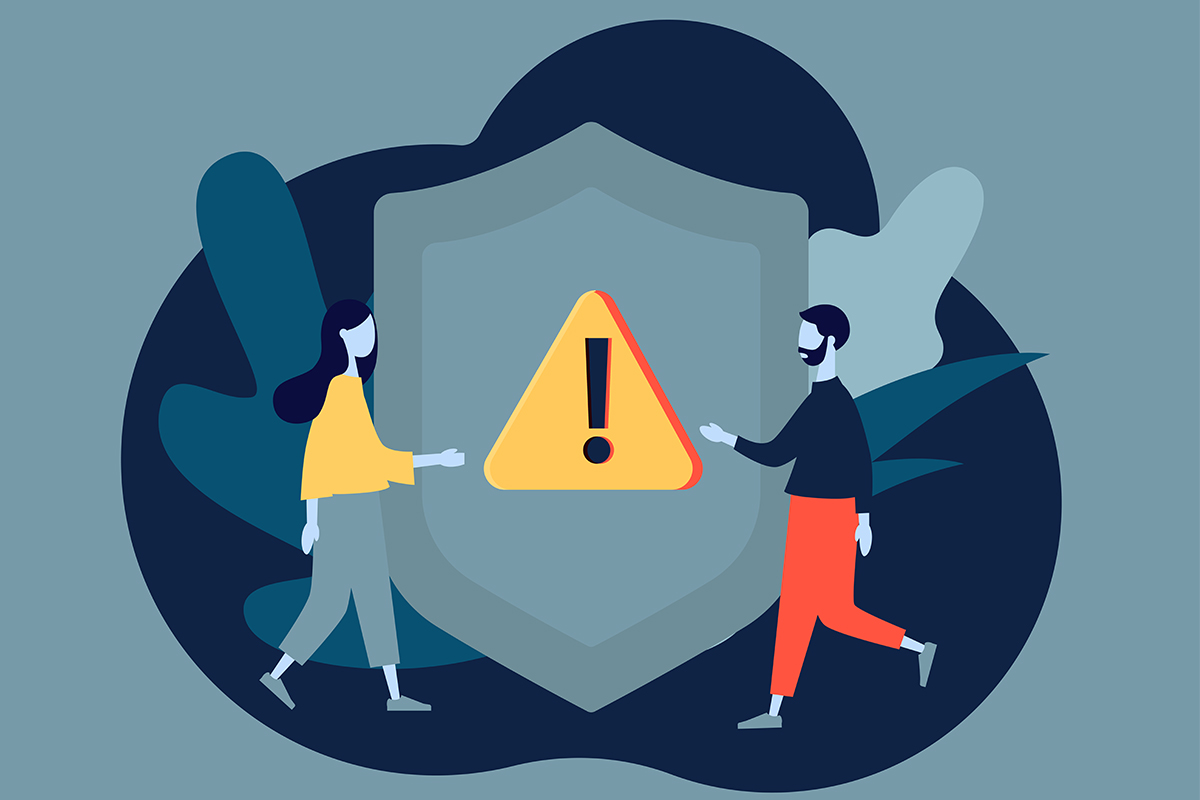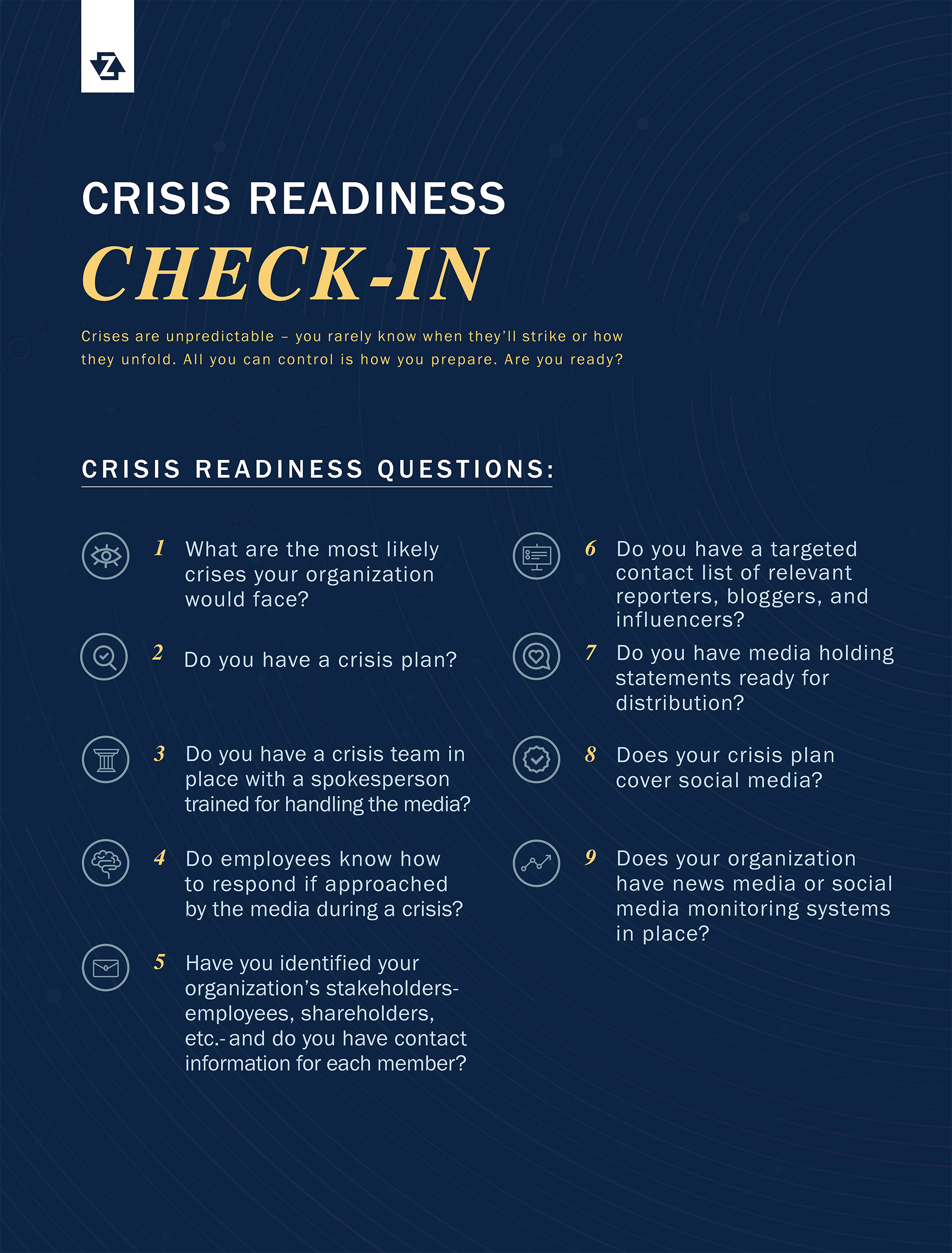
Crisis Communication 101
In the words of Warren Buffet, “It takes 20 years to build a reputation and five minutes to ruin it. If you think about that, you’ll do things differently.” These days, this sentiment rings truer than ever.
That’s why you need a crisis communication plan.
By nature, crises are unpredictable. You rarely know when they’ll strike or how they unfold. All you can control is how you prepare.
It’s human nature to think disaster won’t happen to you. But every company, even the most successful, finds itself in a crisis at some point. The question is: are you ready to deal with the fallout?

Why you need a crisis plan
From data breaches and layoffs to workplace accidents and lawsuits, corporate disasters happen every day to all kinds of companies. What will you do when one hits yours?
If you get a call from a reporter, it's already too late. You need a crisis communication plan in place and ready to go.
A crisis communication plan functions as a blueprint for your business in times of crisis. It helps you respond quickly and effectively, transforming the crisis into an opportunity to showcase your values. Without a plan in your back pocket and a well-trained crisis team, you’re flying blind into a minefield of consequences.
If you don't take stock and prepare when things are running smoothly, you leave yourself vulnerable when a crisis strikes. Phones ring off the hook with calls from upset customers, an outraged board of directors, and confused employees…unless you have a response plan that gives you the confidence to handle the crisis the right way.
A well-executed crisis response plan is a streamlined document to direct crisis management. It’s a work in progress that is updated regularly, helping you conduct risk assessments ahead of time. This strategic and responsive approach minimizes damage and negative press, ensuring you say the right thing at the right time and preserve your company’s integrity.
Savvy companies rely on a set of impartial outside eyes when putting this plan together. With a crisis expert on your side, you avoid the pitfalls of groupthink and herd mentality that can cloud your vision.
How crisis training works
Every crisis has the potential for silver linings. But to see the bright side, you need the right response. There will be a break in the clouds if you mitigate properly, and a firestorm if you say the wrong thing. That’s where crisis training comes in.
Crisis training takes you from reactive to proactive mode, cultivating a strategy to demonstrate readiness and inspire confidence. This quick response turnaround leaves less time for media and public speculation, helping you guide the narrative. So, how is it done?
In a nutshell, crisis training is all about building muscle memory so you and your team know how to respond to mic-in-face scenarios. Crises turn up the pressure, but if handled correctly, that pressure can make diamonds.
You can buy all the advertising in the world, but nothing shows your true colors like a crisis. With the right plan and proper training, you can transform it into an opportunity to do something you ordinarily can’t: show that your brand values really mean something. After all, a crisis is a terrible thing to waste. It connects you to your audience, giving you the chance to talk to press and build your brand.
Instead of viewing a crisis as damage control, reframe it as an opportunity to shine…just don’t confuse shining bright with adding kerosene to the fire. In the world of crisis communication, saying nothing is sometimes better than saying the wrong thing. When you’re tempted to talk yourself into a hole, remember the old adage for mothers of the groom at the wedding: “Shut up and wear beige!” It might sound harsh, but the advice is priceless. Knowing when to speak and when to be quiet can make or break your crisis plan. It’s better to pipe down than to make the wrong statement with the wrong tone.
Ultimately, you do want to say the right thing right off the bat. Don’t get defensive – if you approach the situation with tact, you’re on the path to success.



How a team like Zehnder can help you prepare
No one wants to consider that the worst could happen to their company. That’s why hiring an outside crisis consultant can give you the honest perspective and preparation you need.
Knowing what to do when a crisis hits can make or break your business. And when disaster strikes you unprepared, you’re left with a lot of questions: Should I keep posting on social media as scheduled, or take a break? Should I delete comments and block angry followers, or step back? Should I argue our side, or take the high road?
With a crisis expert on your side, you can learn how to handle these challenges with empathy while still protecting your brand. From choosing your internal crisis team to detecting early disaster warning signs, a well-equipped crisis management team can set you up for success.
We work to understand your brand and brand evolution. This determines the path we take to develop a comprehensive strategy and work through it over time. Whether you need help developing holding statements for most likely crisis scenarios or deciding which social media channels to own in preparation for a future crisis, the experts at Zehnder can help you forestall disaster. If you wait until crisis has already struck, it may be too late, especially in the age of 24/7 news cycles and the lightning-fast spread of information.
Crisis management is about more than just preparation – it’s also about prevention. We work to build internal awareness of potential issues and help you cultivate an environment where worried employees feel comfortable raising their concerns. Even if they just have a bad feeling, addressing these worries thoughtfully and intentionally is going to help you prepare for (and ideally prevent) crises. Though they may feel uncomfortable, difficult conversations prevent dire emergencies.
Safeguard your brand with specialized support
While you can’t see the future, you can do everything in your power to protect yourself and your company from scrutiny. But you can’t help direct the narrative if you don’t participate in the story. That’s why you need a crisis management team now. From expediting response time to creating an action plan, you need experts on your side to cushion future blows and develop a foolproof strategy.
Reach out to the pros at Zehnder to minimize damage and maximize opportunity for your business.






